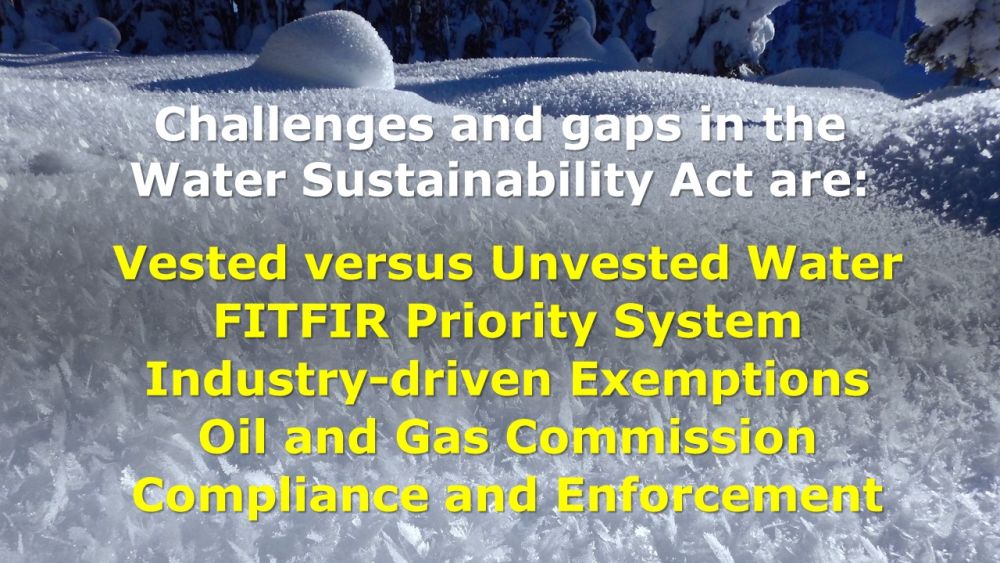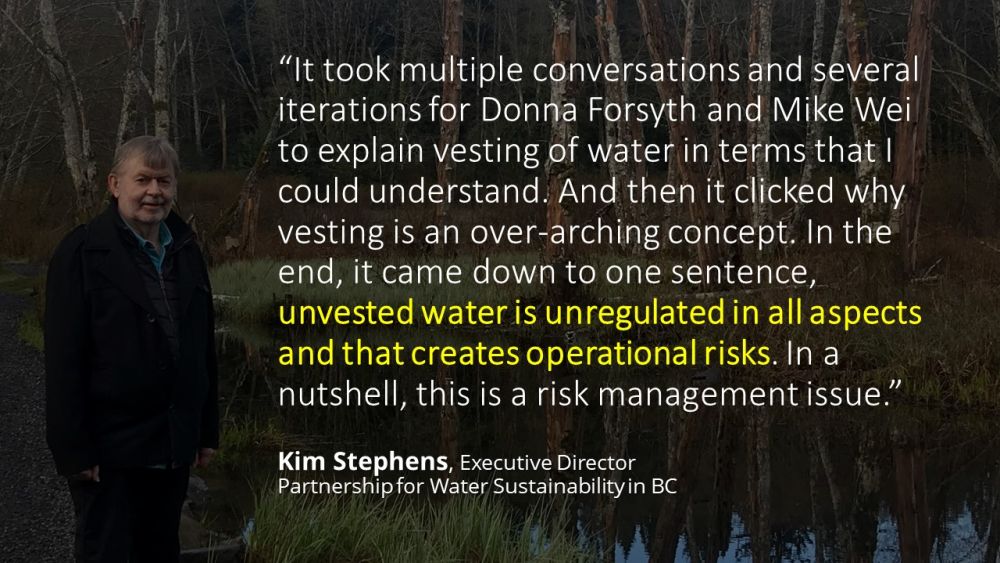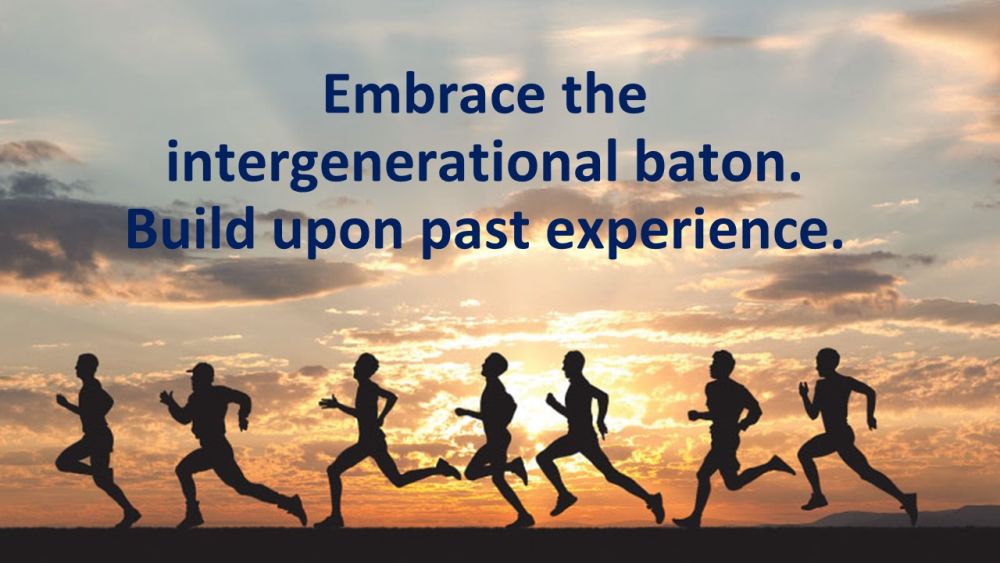STRENGTHENING THE FOUNDATION FOR WATER LAW IN BRITISH COLUMBIA: “Donna Forsyth and Mike Wei bring an informed perspective to their quest to strengthen the foundation for BC water law. They draw on decades of experience to pull threads of understanding from the past through to the present,” stated Kim Stephens, Partnership for Water Sustainability (April 2022)
NOTE TO READER:
Waterbucket eNews celebrates the leadership of individuals and organizations who are guided by the vision for Living Water Smart in British Columbia to build greener communities and adapt to a changing climate; and embrace “design with nature” approaches to reconnect people, land, fish, and water in altered landscapes.
In this article about challenges and gaps in the Water Sustainability Act, retired senior civil servants Donna Forsyth and Mike Wei explain what “vesting of water” means and why everyone in British Columbia should care. The article was published on April 12, 2022.
DOWNLOAD A COPY: https://waterbucket.ca/wcp/wp-content/uploads/sites/6/2022/04/PWSBC_Living-Water-Smart_decadal-opportunity_2022.pdf

Moving towards Water Sustainability Act 2.0
When the Water Sustainability Act (WSA) came into force in 2016, “certain things were left behind”. Now, the Province’s Discussion Paper on Watershed Security Strategy represents a once per decade window of opportunity to revisit assumptions and decisions that defined the WSA scope, reflect on the context for those assumptions and decisions, and determine what action should be taken in light of new understanding.
For context, consider that the “request for legislation” that became WSA was introduced in 2012. It then took until 2016 before the WSA came into force. On the 10th anniversary of that request, the door has again opened. Hence, the importance of drawing attention to known gaps and challenges in the WSA.
In this edition, and as a public service in the broader interest of contributing to a balanced conversation about water resource management in BC, the Partnership for Water Sustainability is sharing an article contributed by Donna Forsyth and Mike Wei.

A once-in-a-decade opportunity for water sustainability
Retired senior civil servants Donna Forsyth and Mike Wei introduced five challenges and gaps in broad-brush terms in the April 5, 2022 edition of Waterbucket eNews. Addressing these gaps would bring the WSA to the next level which Donna and Mike call “WSA 2.0”.
Their analysis on the need for WSA 2.0 was originally submitted to the government in response to the engagement on the Watershed Security Strategy discussion paper.
However, when they looked at the gap in the WSA resulting from the existence of “unvested water”, they soon realised that the implications of this gap go much further and it could limit the application of any and all water-related laws in the province. For this reason, Donna Forsyth and Mike Wei wish to focus our attention on what they believe is the urgent need to “vest all water” in BC.
Quotable Quote
“Vesting all water does not mean the use of every drop will or needs to be regulated. That concern is a red herring. The real issue centres on what government cannot do when the water use involves unvested water. The concern should be whether a jurisdictional gap in the Water Sustainability Act has a domino effect. Mike and my understanding is that unvested water use remains outside all water-related provincial legislation. Once the implications of this gap become part of the conversation, the need for vesting all water should become both highly ‘visible’ and impossible to ignore,” states Donna Forsyth.

EDITOR’S PERSPECTIVE
“The Partnership for Water Sustainability has no current position on “vesting of water”. Unvested water occurs primarily on private land. This statement of fact sets the context for this edition of Waterbucket eNews. When Donna Forsyth and Mike Wei said they wished to contribute an article about vested versus unvested water, my initial reaction was what does that mean and why should I care? More importantly, why would our readers care, I added,” stated Kim Stephens, Waterbucket eNews Editor and Executive Director.
“On the other hand, if there is one sector that does care and does know what vesting means, it is the agriculture sector. There are many instances of water collected from their properties before it enters the ground or a stream that are evident and producers know that in this case, they currently do not need a licence. This example serves as a reminder of the importance of thinking through an issue to avoid unintended consequences. And that is a takeaway message for this article.”
“Donna and Mike have drawn attention to a jurisdictional gap in the Water Sustainability Act because of the potential for a domino effect. Initially I had trouble wrapping my mind around why Waterbucket eNews would feature a topic related to water law. However, I do respect the passion Donna and Mike bring to a conversation about challenges and gaps in the Water Sustainability Act. So, I asked, is there a “story behind the story” that would interest our readers?”

Why should we care whether use of water is vested or not?
“When Donna referred to the inter-generational baton, she had my attention. She described Mike and her desire to hand off the baton so that WSA history, understanding and expertise are not lost when needed most,” continued Kim Stephens.
“When each generation, and this includes governments, is receptive to accepting the inter-generational baton and welcoming the wisdom that goes with it, the decisions of successive generations will benefit from and build upon the experience of those who went before them.”
Timing is Everything
“Donna Forsyth and Mike Wei bring an informed perspective to their quest to strengthen the foundation for BC water law. They draw on decades of experience to pull threads of understanding from the past through to the present. They are keen to share their insights with an audience that cares about water.”
“The window of opportunity for them to draw attention to the jurisdictional gap is the current engagement process for the Watershed Security Strategy. Timing is everything because one only gets one chance per decade. This is the reason they are so passionate about the need for government to deal with lingering issues before they morph into unintended consequences.”
“It took multiple conversations for Donna and Mike to explain vesting of water in terms that I could begin to understand. In the end, it came down to one statement that intuitively made sense to me, unvested water is unregulated in all aspects and that creates operational risks. Because I am a water resources engineer by training and experience, risk management is a theme that resonates with me.”
What Do You Wonder?
“Mike and Donna then explained that government can include exemptions once water is vested. This is what provides operational flexibility. The real issue, they emphasized, centres on what government cannot do when the water use involves unvested water.”
“Now I think I understood why I should care, and I am wondering how you the reader will respond to the “story behind the story” that follows. Will it be, “so what”? Or will it be, “so what can be done”? Either way, you will at least be aware that there is a jurisdictional gap!” concluded Kim Stephens.

What Vesting of Water Means and Why Everyone Should Care – the “story behind the story” as told by Donna Forsyth and Mike Wei, retired senior civil servants
The mechanism for bringing forward challenges and gaps in the Water Sustainability Act (WSA) is the current consultation process for the Watershed Security Strategy which has identified 10 desired outcomes.
In their article titled Why we need to talk about “unvested water” in BC, Donna Forsyth and Mike Wei include a table summarizing the vesting provisions for the provincial and territorial jurisdictions in Canada.
This scan shows that vesting of all water is common in other Canadian jurisdictions with the exception of BC, Prince Edward Island and Newfoundland-Labrador where only groundwater and surface water in watercourses appear to be vested.
Vested versus Unvested Water
“Simply put, since ‘vesting’ is the legal concept that gives the province the ‘ownership’ of water that gives them the authority to manage its diversion and use, none of the provincial laws around water will apply to ‘unvested water’,” explain Donna Forsyth and Mike Wei.
“Currently, the wording of section 5 of the WSA establishes the vesting ‘boundaries’ in BC. The result is that water that has not reached a ‘stream’ or gone into the ground is ‘unvested’. This would include harvested rainwater or snow.”
Why is this a problem?
“Originally we focused on the result that there is no capacity to manage, restrict or regulate the diversion or use of unvested water in order to protect the environment or other water users using the tools under the WSA and that this limitation would present additional challenges for the Watershed Security Strategy,” state the authors.
“Now we realise that it is possible that no water-related legislation, bylaw, plan or strategy can be applied to ‘unvested water’.”
“For example, that means that the laws that prevent the bulk transport of water out of the province do not apply. Neither do the laws that protect drinking water users. In addition, the authority for local governments to manage drainage and storm water through bylaws may not exist, because their ability to make bylaws generally comes from a delegation of the provincial authority.”
A Call to Action
“This analysis has led us to conclude that our first ‘deeper dive’ into the challenges with the WSA needs to be a ‘call to action’ to examine the implications that unvested water has on all water legislation in the province, including the implementation of the WSA tools and the Watershed Security Strategy.”
“At the very least, there is an urgent need to review the impact of having ‘unvested water’ use and users sitting outside the scope of any of our water-related provincial laws.”
Quotable Quote
“Donna Forsyth and I are saying that vesting of water by government is ultra-important. But what vesting means is almost invisible to most people. Often it is assumed that ALL water is vested in BC, but NOT ALL water is vested. Over the years, my thinking has evolved – from thinking ‘so why should I care’, to appreciating that legally vesting is ultra important because of how it translates into what government can and cannot do operationally,” concludes Mike Wei.
Did you enjoy this article? Would you like a PDF document version? Waterbucket News feature stories are published online as part of the Living Water Smart Series. Click on the image below to download your copy.
DOWNLOAD A COPY: https://waterbucket.ca/wcp/wp-content/uploads/sites/6/2022/04/PWSBC_Living-Water-Smart_decadal-opportunity_2022.pdf


